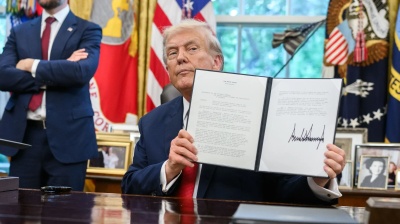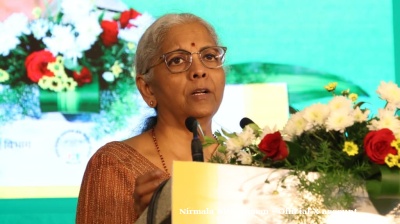Bulgaria’s ruling coalition announced a series of initiatives on July 17, aiming to show it is not dependent on the opposition ethnic-Turk Movement for Rights and Freedoms (DPS) in an attempt to calm down the nightly protests that have drawn tens of thousands of people, and restore stability in the biggest political crisis for years.
The DPS, which is formally in opposition, has become a symbol of corruption since in 2009 its chairman of honour Ahmed Dogan said during an election campaign he was the person “distributing the portions of financing in the country”. Dogan has also openly admitted he has been behind all major political appointments in the country. The party’s MPs include businessman Delyan Peevski, who has been accused of gaining billions through corrupt deals.
The protesters who have gathered for nine days in a row in the capital Sofia and many other Bulgarian towns, demanding the resignations of the government and chief prosecutor Ivan Geshev, accuse Boyko Borissov’s government of being dependent on the DPS even though it is formally in opposition. Despite not holding any official post, Dogan is seen as the country’s most powerful politician.
In an interview with Nova TV, Valeri Simeonov, the leader of the National Front for Salvation of Bulgaria (NFSB), one of several small far-right parties within the ruling coalition led by Borissov’s Gerb party, talked of government decisions that appeared to be “serving” Dogan.
Speaking on Nova TV, which is believed to be close to the government following a change of ownership, Simeonov related some of the topics discussed at a coalition meeting the previous day, which included funding for the cold reserve.
In September 2018, Dogan bought the Varna coal-fired power plant (Varna TPP), which now secures a significant amount of the country’s cold reserve, in a deal marred by controversy and lack of clarity. The deal raised questions regarding Dogan’s already very strong influence in Bulgarian politics and on the energy sector as Varna TPP.
At the end of July 2019, Bulgaria’s Electricity System Operator (ESO) distributed BGN26.5mn to Varna TPP for securing the cold reserve over the winter. Critics of the decision, including NGO the Anti-Corruption Fund (ACF), expressed concern, not least because the power plant’s ability to actually produce the necessary electricity was in question.
Although the deal was referred to the Bulgarian prosecution twice, Geshev and his predecessor Sotir Tsatsarov refused to launch an investigation into it.
“Yesterday we realised that, in some cases, the work of the government was almost connected with serving Dogan. In this regard, we decided to completely change the scheme of the cold reserve,” Simeonov said on July 17.
He added that the cold reserve will be lowered, most likely to just a tenth of its current level, which will significantly reduce the sums going to Dogan.
Simeonov said the government will reconsider the planned construction of a channel leading to the port near Varna TPP, which was planned to be built by the state.
Simeonov also discussed construction work at Dogan’s summer villa on the Black Sea coast, saying that a pier near the villa was built illegally.
Before the protests, the government claimed the pier was completely legal, while a significant hike in the cold reserve money was explained as demanded by EU regulations.
Simeonov said the regional construction control authority has found illegal constructions at Dogan’s villa, which is located near the seaside town of Burgas. These buildings will be destroyed, he said. However, several hours later news outlet Dnevnik wrote that his words were not confirmed by the state authorities as they said there was an ongoing investigation. The probe was ordered by Geshev after the protests erupted.
Simeonov once again repeated the ruling coalition would never collaborate with the DPS as the party was “extremely devious, it is the curse of the transition [from communism] because it divides Bulgarians”.
Few people believed Simeonov’s words and tens of thousands again took to the streets of Sofia and more than ten other towns on the evening of July 17.
Dnevnik reported that some serving prosecutors demanded Geshev’s resignation on July 17 along with supporters of the civic initiative Justice for Everyone.
In the last few days, Bulgarians living abroad also started gathering to demand the resignations of Borissov’s government and of Geshev.
In response, Borissov initially demanded the resignations of three key ministers but put them on hold the next day and said the government will not resign but will serve its full mandate. Borissov said that he would make changes to his cabinet after a no-confidence motion filed by the opposition Bulgarian Socialist Party (BSP) that should be voted on by MPs July 20. The motion will fail as Borissov has the support of enough MPs in parliament.
News

Trump authorises CIA covert operations in Venezuela to topple Maduro
The White House has acknowledged granting the Central Intelligence Agency sweeping powers to conduct covert operations aimed at unseating President Nicolás Maduro, the NYT reported.

India’s finance minister to miss upcoming IMF and World Bank meetings
India’s Finance Minister Nirmala Sitharaman will not attend this week’s annual meetings of the International Monetary Fund and World Bank in Washington, as trade negotiations between New Delhi and Washington remain unresolved.

Young Ukrainians asylum seekers fleeing the war for Germany surges
The number of young Ukrainian fleeing the war and seeking asylum in Germany has surged, following Ukraine’s decision to partially lift its travel ban for men aged 18 to 22, according to figures from the German Interior Ministry.

US may double support for Argentina to $40bn conditional on policy reforms
Washington buys Argentine pesos and mulls creating a new private sector-led $20bn debt facility, which would bring total support to $40bn with the existing swap line, Treasury Secretary Bessent said.




